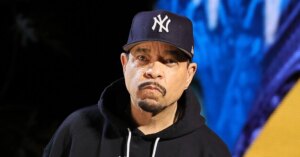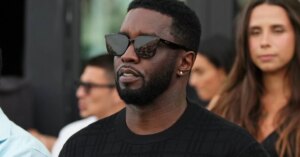This Couple’s Journalism Project Centers Black Brooklyn Businesses


Photo Credit: Courtesy of Black-Owned Brooklyn
Husband-and-wife duo Tayo and Cynthia Gordy Giwa have spent the last few years documenting the Black business boom in Brooklyn.
In the earliest stages of their relationship, Tayo and Cynthia Gordy Giwa often found themselves walking throughout the Bedford-Stuyvesant neighborhood Tayo lived in. It was during those long walks that Cynthia — a marketing executive, and former journalist — and Tayo, a media and technology lawyer and photographer, had an epiphany about the local businesses they would stumble upon. “They were not being talked about in a substantive way,” Gordy Giwa told me during a Zoom call from the Brooklyn home she shares with her now-husband Tayo.
Instead of waiting for someone to begin covering these businesses in a way that felt homegrown, Gordy Giwa and her friend Glen Allen created Black-Owned Brooklyn, the website and an Instagram page dedicated to profiling Black-owned establishments in the borough. Allen left after the first year, but Tayo assisted heavily in the planning and execution of what eventually became a dedicated community of over 100,000 followers on Instagram. What makes Black-Owned Brooklyn work? It’s a local journalism project curated by two people who love the subjects they’re covering. Tayo feels that highlighting businesses throughout Brooklyn is their way of paying tribute to the community they are a part of. He also says that they handpick entities that they feel are “extraordinary.” Through sharp imagery and long, concise captions stories unfold. Tayo adds that their engaged followers often support the companies that are covered.
To chronicle the stories of their community, Tayo, who was born in Nigeria and raised in Long Island and Cynthia, originally from Philadelphia, actively add to a list of 40 to 50 businesses they hope to spotlight. They also receive pitches from followers, friends, and others that they take into consideration.
“We want to feature both new and old businesses,” Cynthia said. “We [also] want to feature a diversity of genders, of ethnic backgrounds, restaurants, [and] clothing stores.” Past businesses they’ve featured include Kokomo, a buzzy Williamsburg restaurant known for its Caribbean-inspired cuisine, and Aunts Et Uncles, a vegan all-day cafe. Tayo shares they still take walks to discover options too. “I feel like one of the best things about this project [is] to walk down the street and know business owners and be with our kids and have them think that’s normal,” he adds.
Their latest creative project consisted of creating and producing a film chronicling a pan-African cultural organization, The East founded in 1969 that is responsible for the energy that’s still prevalent in Bed-Stuy. Sun Rises in The East (not currently available to stream) also paints an intimate portrait of the rich history of East Brooklyn that’s often erased. In it, a bevy of personalities who grew up in the East share stories of the institutions that were once thriving: a food co-op, a publisher, a jazz club, an African-centric school, and more (all Black-owned).
“I think that’s something that the film really points to – Brooklyn didn’t just become cool,” Tayo said. “Sometimes there’s like a cliche version of Brooklyn that’s very white hipster. But there’s so much more to it, central Brooklyn is a significant place in the Black diaspora.”
We had a conversation with the husband-and-wife duo behind Black-Owned Brooklyn about their beloved Instagram page, their new documentary, The Sun Rises in The East, and more.
What do you think about the idea of Bedford-Stuyvesant being a Black utopia?
Tayo: There’s something definitely in the water. This is like an urban center with one of the highest concentrations of Black people in any big city outside of Nigeria [and] Brazil. Because there are so many black people here, the culture runs so deep and it’s such a rich, wealth to sort of mine, as we sort of tell these stories about our community, because there’s so much here and there so many different types of people and so many, and for it’s been happening for so long that it’s really rich.
Cynthia: The initial impetus for Black-Owned Brooklyn was like, “Let’s tell the stories of these cool businesses that I’m interested to know more about.” Businesses are a lens through which you can also have these much broader conversations about Black culture and Black history and spaces in a gentrifying community or a gentrified community, depending on which part you’re in. When we say Black-Owned Brooklyn, it’s not only businesses, right. It’s also we own our culture and we own our history and we own our spaces in this community.
Where did the idea to create a film centering on a specific community in Brooklyn stem from?
Cynthia: We had always been fascinated by the East as like a rich history that we wanted to dig into in general in some type of way, but it’s not like we immediately heard about the East and thought we got to do a film on it. I think just our storytelling mediums have evolved over time. So Tayo has really led that ship for us.
Tayo: The thought was, we’d make [a] short on the East and it really quickly dawned on us that there was just way too much story to do it in a short. I mean, there’s so many different aspects of the East from the school strike, to the jazz scene, to the independent school, to all the different businesses they create [and] the International African Arts Festival. If you talk to music heads, they know about the jazz scene in the East.
To tie the thread together of all these different pieces of history, no one had really done that sort of in a cohesive way. A large amount of [the] public are still ignorant about who was the East. So we thought it was important as the first people to tackle [we needed to] tie this thread of the story and take people through this history so that [they] understand there’s actually a source from what created this and that source is actually still having an effect 50 years later.
What are some of the biggest themes covered in The Sun Rises in The East?
Tayo: This is a celebration of black people, our contributions to mankind or place in society, and sort of looking at the people and the students and the children in the community and seeing them as people with potential. And it’s like Jitu Weusi, who [was] the key figure [in] founding the East and leading the East, so many people to this day are, inspired by him because of what he saw in them. That whole movement in the East [was] incredible.
Cynthia: It’s hard to really describe the significance that the East had on so many people. It would be really easy to just like tick off the list of businesses and institutions that they created. They had their own bookstore and their own magazine, their own record label, and their own clothing shop, and they had a farm. All these incredible things, but all of that stuff was guided by a search for Black liberation. They were all guided by very deliberate principles like community self-determination, collective work, responsibility, creativity, [and] purpose. They lived those principles.
And they started from the youngest of ages, instilling that confidence in that collective power into people. And that is how they were able to do what they did. I think the one other piece that is really important is that this isn’t just a Brooklyn story. I mean, the East is just as significant as any of the other organizations that you might associate with like the Black Power era or Civil Rights era. The East were comrades with all of these other organizations. It was a central hub for thinkers and leaders and organizers to come together and build together.







